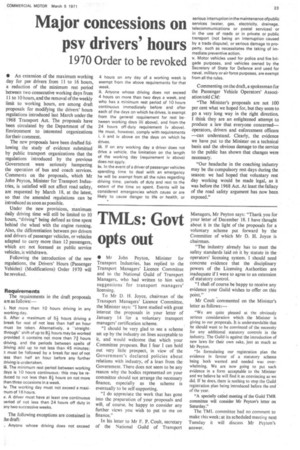Major concessions on psv drivers' hours
Page 25

If you've noticed an error in this article please click here to report it so we can fix it.
1970 Order to be revoked
• An extension of the maximum working day for psv drivers from 11 to 16 hours, a reduction of the minimum rest period between two consecutive working days from 11 to 10 hours, and the removal of the weekly limit to working hours, are among draft proposals for modifying the drivers' hours regulations introduced last March under the 1968 Transport Act. The proposals have been circulated by the Department of the Environment to interested organizations for their comment.
The new proposals have been drafted following the study of evidence submitted by public transport organizations that the regulations introduced by the previous Government were seriously hampering the operation of bus and coach services. Comments on the proposals, which Mr John Peyton, Minister for Transport Industries, is satisfied will not affect road safety, are requested by March 18, at the latest, so that the amended regulations can be introduced as soon as possible.
Under the new provisions, maximum daily driving time will still be limited to 10 hours, "driving" being defined as time spent behind the wheel with the engine running. Also, the differentiation between psv drivers and drivers of passenger vehicles, or vehicles adapted to carry more than 12 passengers, which are not licensed as public service vehicles, is withdrawn.
Following the introduction of the new regulations, the Drivers' Hours (Passenger Vehicles) (Modifications) Order 1970 will be revoked.
Requirements The requirements in the draft proposals are as follows:
i. Not more than 10 hours driving in any working day.
ii. After a maximum of 5+ hours driving a break for rest of not less than half an hour must be taken. Alternatively, a -straightthrough" shift of up to 8+ hours may be worked provided it contains not more than n hours driving, and the periods between spells of driving add up to not less than 45 minutes; it must be followed by a break for rest of not less than half an hour before any further driving is undertaken.
iii. The minimum rest period between working days is 10 hours continuous; this may be reduced to not less than 8+ hours on not more than three occasions in a week.
iv. The working day must not exceed a maximum of 16 hours.
v. A driver must have at least one continuous period of not less than 24 hours off duty in any two successive weeks.
The following exceptions are contained in the draft:
. Anyone whose driving does not exceed 4 hours on any day of a working week is exempt from the above requirements for that week.
ii. Anyone whose driving does not exceed 4 hours on more than two days a week, and who has a minimum rest period of 10 hours continuous immediately before and after each of the days on which he drives, is exempt from the general requirement for rest between working days (iii above), and from the 24 hours off-duty requirement (v above). He must, however, comply with requirements ii and iv above on the days on which he drives.
iii. If on any working day a driver does not drive a vehicle, the limitation on the length of the working day (requirement iv above) does not apply.
iv. In the event of a driver of passenger vehicles spending time to deal with an emergency he will be exempt from all the rules regarding driving time, periods of duty and rest to the extent of the time so spent. Events will be considered emergencies which cause or are likely to cause danger to life or health, or
serious interruption in the maintenance of public services (water, gas, electricity, drainage, telecommunications or postal services) or in the use of roads or in private or public transport (not being an interruption caused by a trade dispute), or serious damage to property, such as necessitates the taking of immediate preventive action.
v. Motor vehicles used for police and fire brigade purposes, and vehicles owned by the Secretary of State for Defence and used for naval, military or air force purposes, are exempt from all the rules.
Commenting on the draft, a spokesman for the Passenger Vehicle Operators' Association told CM:
"The Minister's proposals are not 100 per cent what we hoped for, but they seem to go a very long way in the right direction. I think they are an enlightened attempt to produce a law that everyone concerned— operators, drivers and enforcement officers —can understand. Clearly, the evidence we have put to the Minister on a technical basis and the obvious damage to the service to the public has shown that changes were necessary.
"Our headache in the coaching industry may be the compulsory rest days during the season: we had hoped that voluntary rest day working would be made legal, as it was before the 1968 Act. At least the fallacy of the road safety argument has now been exposed."




































































































